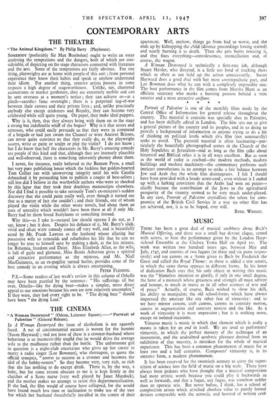CONTEMPORARY ARTS
THE THEATRE
"The Animal Kingdom." By Philip Barry (Playhouse).
SOMEBODY (preferably Sir Max Beerbohm) ought to write an essay analysing the temptations and the dangers, both of which are con- siderable, of depicting on the stage characters connected with literature and the arts. Some of the temptations are fairly obvious. For one thing, playwrights are at home with people of this sort ; from personal experience they know their habits and speak or anyhow understand their idiom. For another thing, creative artists possess in some respects a high degree of stageworthiness. Unlike, say, chartered accountants or market gardeners, they are extremely mobile and can be sent overseas at a moment's notice ; they can achieve or—at a pinch—sacrifice fame overnight ; there is a perpetual tug-of-war between their careers and their private lives ; and, unlike practically anybody else except oricketers and Royalty, they can become very celebrated while still quite young. On paper, they make ideal puppets.
Why is it, then, that they always bring with them on to the stage a strong but indefinable whiff of the bogus? Why is it that actors and actresses, who could easily persuade us that they were in command of a brigade or had just swum the Channel or were Ancient Britons, can never quite convince us that they really do, as the playwright asserts, write or paint or sculpt or play the violin? I do not know ; but I do know that half the characters in Mr. Barry's amusing comedy are people of this kind and that, although they are intensely plausible and well-observed, there is something inherently phoney about them.
I never, for instance, really believed in the Bantam Press, a small but very pure publishing house which the feckless but golden-hearted Tom Collier ran with unswerving integrity until his wife Cecelia debauched it by persuading him to publish a couple of best-sellers ; still less did I believe in the worthwhile authors who were so shocked by this lapse that they took their deathless manuscripts elsewhere. Nor did I find it possible to take seriously Tom's ex-mistress's sudden discovery that she could paint really well, even though it turned out that as a matter of fact she couldn't ; and their friends, one of whom played the violin while the other wrote novels, had about them an aura of unreality which wouldn't have been there at all if only Mr. Barry had let them breed Sealyhams or something instead.
Why this—as I take it—natural law should operate I do not, as I say, know ; but it does. Despite his defiance of it, Mr. Barry's slick, vivid and often witty comedy comes off very well, and is beautifully acted by Mr. Frank Lawton as the husband whose alluring but possessive wife so remoulds and refurbishes his life that he can no longer be true to himself save by making a dash, at the last minute, for Bohemia, freedom and Daisy. Miss Elizabeth Allan, as the wife, is full of guile and glamour, Miss Renee Asherson gives a spirited and attractive performance as the mistress, and Mr. Niall MacGuinness, as an ex-pugilist turned butler,. provides some of the best comedy in an evening which is always entertaining. PEIER FLEMING.
P.S.—Some readers of last week's review in this column of Othello may have been puzzled by the sentence: "His sufferings all but over, Othello—like the dying bear—makes a simpler, more direct appeal to our emotions because his own are now relatively uncomplex." If they were, they had every right to be. "The dying bear" should have been "the dying Lear."


































 Previous page
Previous page